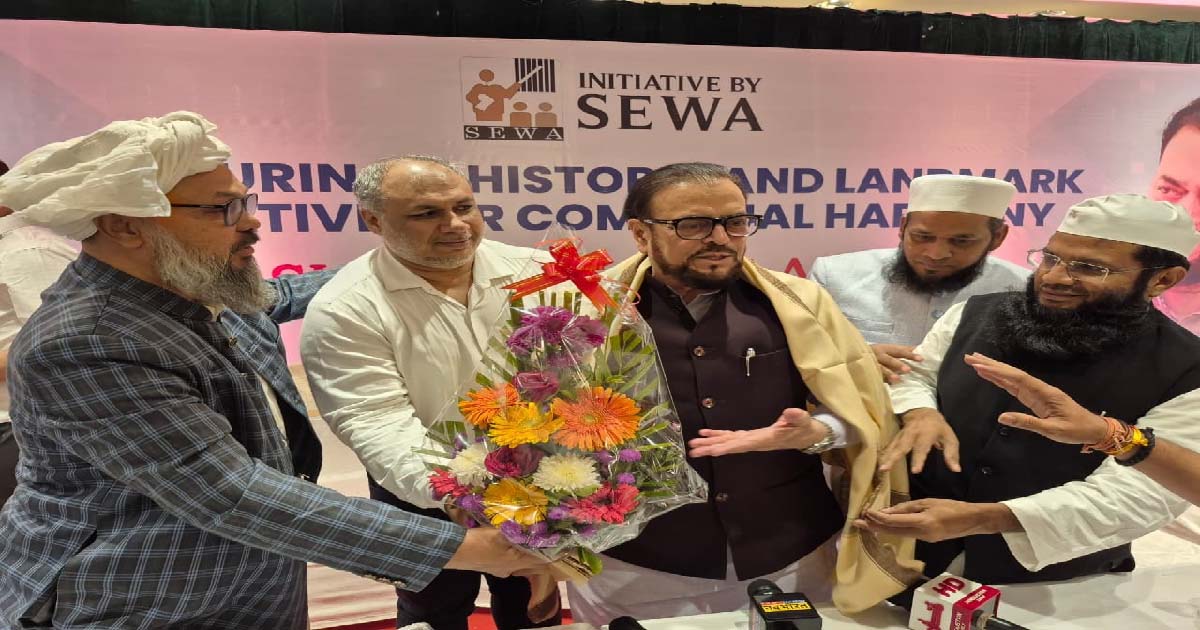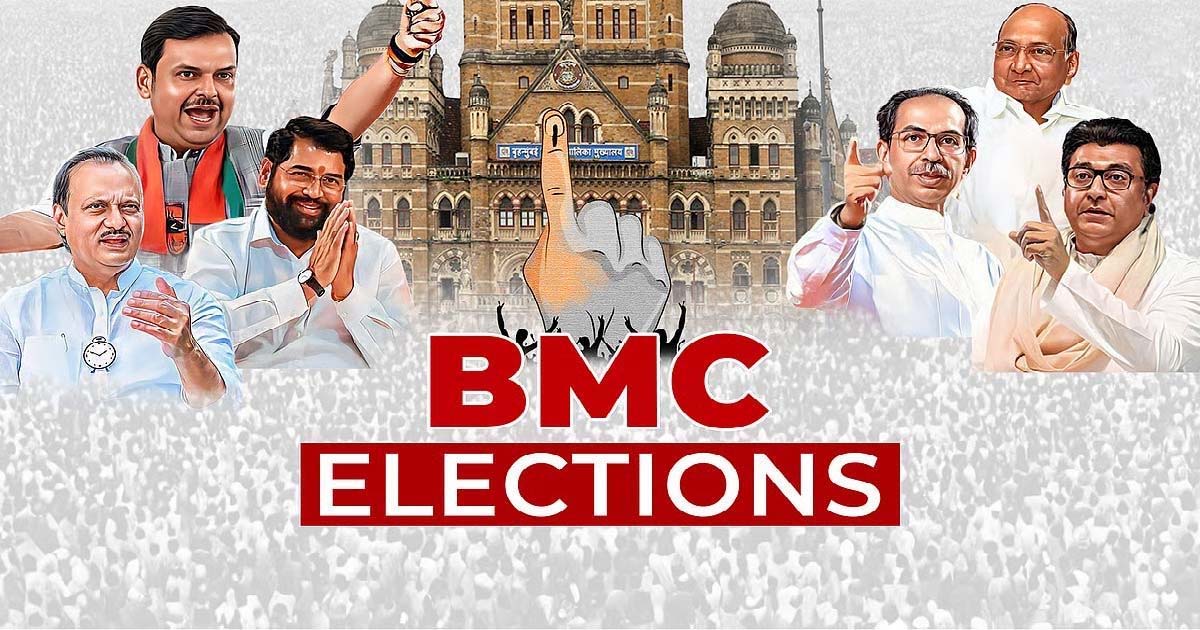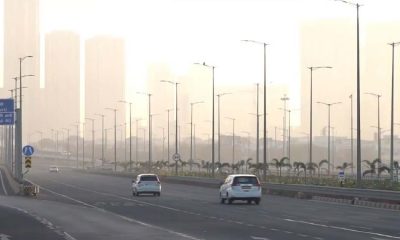Maharashtra
‘EVMs Cannot Be Hacked,’ Says Maharashtra’s Additional Chief Electoral Officer Kiran Kulkarni On Opposition Allegations

Mumbai: Amid the Opposition’s allegations regarding Electronic Voting Machines after the Maharashtra polls in which the ruling Mahayuti alliance registered a landslide victory, state’s Additional Chief Electoral Officer Kiran Kulkarni has asserted that EVMs cannot be hacked.
He said that the chips used in the EVMs are one-time programmable, making tampering impossible.
“I say this with full responsibility, EVM cannot be hacked. EVM cannot be tampered with. There is a simple reason for this. First, it is a standalone machine …no connection with any network or outer gadget. So, hacking or tampering is not possible. Second, the chip used in it is one-time programmable, so there cannot be any reprogramming,” Kulkarni told ANI on Tuesday.
He further said that there was no need for misunderstandings regarding EVMs since Election Commission of India (ECI) dictates a procedure that allows for matching of the Voter verifiable paper audit trail (VVPAT) count and votes a candidate has received through EVMs.
This process is observed to ensure there was no discrepancy in these figures, Kulkarni said, while adding that this procedure of comparing the number of votes through VVPAT slips and EVM votes is undertaken before the declaration of the final results.
“There seems to be a lot of misunderstandings among political parties and common citizens regarding EVM. But there is no need for such misunderstandings…When votes are counted and the counting of votes of all EVMs concludes, after that, before the declaration of the result there is a procedure which is prescribed by the Election Commission of India. The procedure says that a lottery is drawn by collecting numbers of all the polling stations in the Assembly constituencies. This lottery is drawn in the presence of the Observer and representatives of all candidates of political parties. Of these, 5 polling stations are selected and VVPAT machines for the 5 polling stations are brought to the counting area. In the presence of everyone, the VVPAT slips are taken out and counted. Which candidate got how many votes as per the slips is counted. This number is matched with the votes voted through EVMs. This is observed that there is no discrepancy in these two figures…The voting in Maharashtra Assembly elections was done in the proper manner by following proper procedure…” Kulkarni said.
Maharashtra Chief Election Office S Chockalingam Rejects Opposition Allegations
Earlier, the Chief Election Officer (CEO) S Chockalingam on Tuesday rejected Opposition allegations regarding the legitimacy of Electronic Voting Machines (EVMs) in the Maharashtra assembly elections and said “no mismatch” was found between the Voter-Verified Paper Audit Trial (VVPAT) slips with their corresponding EVM numbers.
In a statement, the Maharashtra CEO explained that, as per the guidelines of the Election Commission of India, it is mandatory to count VVPAT slips from five randomly selected polling stations in each assembly constituency.
“VVPAT Slip count of randomly selected five polling stations per Assembly Constituency was conducted on November 23, during the counting procedure, in front of the Counting Observer / Representatives of Candidates. As per that, the slip count of 1440 VVPAT units from 288 Assembly Constituencies of Maharashtra State has been tallied with respective Control Unit data,” Chockalingam said.
“There is no discrepancy found between the VVPAT slip count and EVM Control unit count as per the reports received from the concerned DEOs,” Chockalingam added.
About The Row
This comes after the Maha Vikas Aghadi (MVA) alliance partners raised questions about the legitimacy of EVMs following their defeat in the Maharashtra assembly election 2024.
The Mahayuti alliance, led by the BJP, secured a landslide victory in the Maharashtra Assembly elections with the BJP emerging as the largest party with 132 seats in the 280-member Assembly, while its allies–the Shiv Sena, led by Eknath Shinde, and the NCP, led by Ajit Pawar–won 57 and 41 seats, respectively.
However, the Maha Vikas Aghadi (MVA) suffered a major setback as Congress won only 16 seats, while its alliance partners, Shiv Sena (UBT) won 20 seats and the NCP (Sharad Pawar faction) secured just 10 seats.
Maharashtra
Abu Asim Azmi praised for introducing a bill against hate speeches and hate crimes, Muslim organizations called Abu Asim Azmi’s step commendable.

Mumbai: Leading Mumbai NGOs like OZ Seva Trust, Minara Masjid Trust, All India Ulema Board, Malik Liaquat Hussain Trust, National Uni-Ayush Activist Trust, Mumbai Central Association etc. today felicitated SP State President Abu Asim Azmi at Islam Gymkhana and appreciated his efforts to maintain unity and brotherhood in the society by respecting all religions in the Maharashtra Assembly. Azmi had introduced a bill in the Nagpur Assembly to enforce strict laws against religious hatred, blasphemy, prophets, religious leaders, and religious places, and hate speeches and hate crimes.
The event was organised at Islam Gymkhana, Mumbai. Addressing the event, Abu Asim Azmi said that nowadays hatred is being spread among the brothers by making objectionable or insulting inflammatory speeches against any religion, religious leader, religious book, religious place, Prophet Muhammad (PBUH). This poses a threat to peace and order. Therefore, we have presented this bill in the Legislative Assembly against those who insult any religion, religious leader, religious book, religious place, or Prophet. This bill proposes a penalty of imprisonment for up to 10 years and a fine of up to Rs 2 lakh for those who make slanderous statements about any religion, religious leader, religious book, or religious place or spread it on social media. Such a punishment will curb hate speech and hate crimes. MLA Raees Shaikh, State Working President Yousuf Abrani, Chief General Secretary Meeraj Siddiqui and Advocate Rizwan Merchant, Maulana Ijaz Kashmiri, Nizamuddin Rain, Naseem Siddiqui, Sarfaraz Arjo were present at the event.
Maharashtra
A split in Maha Vikas Aghadi before BMC elections, Congress’s slogan is ‘akela Chalo’

The trumpet of the municipal elections has sounded in the state. Voting for 29 municipal corporations will be held on January 15, while the counting of votes will be held on January 16 and the results will be announced. In this election, everyone’s attention will be focused on the Mumbai Municipal Corporation elections. The Shiv Sena Thackeray group will try to retain power in the Municipal Corporation. While Eknath Shinde’s Shiv Sena and BJP will try to rule the BMC in Mumbai. Negotiations on seat sharing are ongoing in Mahayoti, but the electoral understanding has not been completed yet. However, a major rift has arisen in the Maha Vikas Aghadi before the Mumbai Municipal Corporation elections. The Congress has announced to fight the Mumbai Municipal Corporation elections on its own. Due to which the competition in this election has intensified further.
Congress will fight the elections alone
Congress has announced to fight the Mumbai Municipal Corporation elections on its own. Congress’ Maharashtra in-charge Ramesh Chinnathala is currently on a visit to Maharashtra. After a meeting held in Mumbai today, Ramesh Chinnathala has said that he will fight the upcoming elections on his own. He said that there is a lot of corruption in Mumbai. That is why the Congress has decided to fight the elections alone. We have decided to fight against the BJP and the Shiv Sena Thackeray group. True patriots and secular people should support us in this fight. After coming to power, we will resolve the issues of the Mumbai Municipal Corporation in a good way. Therefore, I appeal to the voters to support us and we will develop Mumbai.
Mumbai Municipal Corporation Elections
The State Election Commission had announced the Mumbai Municipal Corporation elections in a press conference on December 15. According to this announcement, candidates will be able to file their applications from December 23 to December 30, 2025. The Election Commission will scrutinize the applications on December 31. Candidates can withdraw their applications till January 2, 2026. Voting for the Mumbai Municipal Corporation elections will be held on January 5. The voting will be held on January 16, 2026 and the results will be declared on the same day.
Maharashtra
After Babri, it’s Kashi Mathura’s turn. Baba Bageshwar Dham’s provocation in Mumbai.

Mumbai: After the Babri Masjid, now it is Kashi Mathura’s turn, the slogan and provocation has been given by Dhirendra Shastri Bageshwar Dham Baba here in Mumbai. While answering the question of journalists in Andheri, Bageshwar Dham said that the temple is ours and we cannot give it up. When Baba was asked that the dispute had ended after the Babri Masjid, then why is the process of finding temples in mosques going on, to which he said that there are temples in many places and the dispute here is old. On Hindu Rashtra, Bageshwar Dham made it clear that there is also room for Muslims in Hindu Rashtra, his aim is to strengthen Sanatan, while a pilgrimage for Hindu Rashtra will start in Maharashtra to promote Hindutva. He said that it is wrong to declare India a secular country because India has never been secular. He said that there is a need for brotherhood and unity in this country and for that he goes on pilgrimage. Baba, while spewing venom, said that if efforts are not made for Hindu Rashtra and Hindus are not united, then the time is not far when the invasion of India will take place. He said that highly educated doctors in the country are becoming terrorists. If there is a Hindu Rashtra, then a Muslim youth will become Abdul Kalam. Will the mayor of Mumbai be a Muslim or a Hindu? On this, Bageshwar Dham said that he is away from politics, so a candidate should be selected who is useful for the people.
-

 Crime3 years ago
Crime3 years agoClass 10 student jumps to death in Jaipur
-

 Maharashtra1 year ago
Maharashtra1 year agoMumbai Local Train Update: Central Railway’s New Timetable Comes Into Effect; Check Full List Of Revised Timings & Stations
-

 Maharashtra1 year ago
Maharashtra1 year agoMumbai To Go Toll-Free Tonight! Maharashtra Govt Announces Complete Toll Waiver For Light Motor Vehicles At All 5 Entry Points Of City
-

 Maharashtra1 year ago
Maharashtra1 year agoFalse photo of Imtiaz Jaleel’s rally, exposing the fooling conspiracy
-

 National News1 year ago
National News1 year agoMinistry of Railways rolls out Special Drive 4.0 with focus on digitisation, cleanliness, inclusiveness and grievance redressal
-

 Maharashtra1 year ago
Maharashtra1 year agoMaharashtra Elections 2024: Mumbai Metro & BEST Services Extended Till Midnight On Voting Day
-

 National News1 year ago
National News1 year agoJ&K: 4 Jawans Killed, 28 Injured After Bus Carrying BSF Personnel For Poll Duty Falls Into Gorge In Budgam; Terrifying Visuals Surface
-

 Crime1 year ago
Crime1 year agoBaba Siddique Murder: Mumbai Police Unable To Get Lawrence Bishnoi Custody Due To Home Ministry Order, Says Report






















